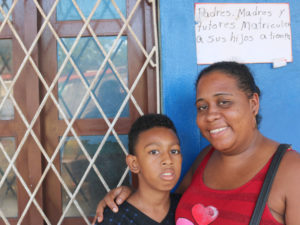Minority women blaze trails with new technical careers in Nicaragua
By Gretchen RobletoFebruary 27, 2017
BLUEFIELDS — Edith Pollack Wilson, 29, knows she is an anomaly in her indigenous and afro-descent community along the South Caribbean Coast, where women typically stay at home. She is one of just two women of 22 students in an Outboard Motor Repair Training Course.
“As a woman, being a minority among her classmates does not inhibit her from asking teachers when in doubt. She is a fighter, determined to prove that she has the same technical capacity as her fellow [male] classmates,” says Julissa Tablada, coordinator for the course at the Centro de Formacion y Desarrollo Integral (Center for Training and Integral Development), the institute in Bluefields where Wilson studies.
“With what I have learned, I can start my own business and work. I never imagined that I would be able to do any of that.”
Wilson received a scholarship for the six-month course at the local vocational education institute through the Technical Vocational Education and Training Strengthening for At-risk Youth project, known in Spanish as “Aprendo y Emprendo.”
The project supports youth from ethnic minorities to develop skills for work and life by enrolling them in technical training followed by internships with potential employers or support to start their own small business. It is funded by the U.S. Agency for International Development and implemented by Creative Associates International.
Wilson is one of 55 women to date to enroll in technical education programs with support from the project. During its five years, the project expects to provide technical vocational education and training scholarships for 1,000 at-risk youth, including indigenous and afro-descendant youth. Half of these scholarships will be for women, with the goal of increasing their participation in non-traditional technical careers.
A backdrop of gender barriers
In Wilson’s traditional community along the country’s Southern Caribbean Coast, her achievements are rare. Women face significant barriers to accessing education and employment opportunities outside the home.
A gender analysis conducted by USAID revealed that women and girls from indigenous and afro-descent communities in Nicaragua are even more likely than non-minority women to be the primary caretakers of children and carry out household tasks, which inhibits their ability to participate in civic and economic activities.
According to the Women’s Network Against Violence, the Southern Caribbean Coast region of Nicaragua ranks third nationally in rates of violence against women.
A businesswoman and role model

Despite the obstacles she faces in her environment, Wilson, who will graduate in March, is determined to achieve and to set an example for her community and her 10-year-old son and 2-year-old daughter. On occasion, she has even had to bring her children to class, lacking childcare options, but this hasn’t deterred her ambition or course performance in the least.
“She is responsible. She knows what she wants and how to achieve it,” says Tablada, the course coordinator.
Wilson says her son sometimes questions her new career path, remarking that she is doing “the work of a man!” In response, she knows exactly what to tell him.
“When my son complains and asks why I do things men do, I tell him that now men and women can do the same and he must always remember that. Men are never going to be more than women; we are equal. I am teaching him the value of women,” she says.
For Wilson’s family, her new career path brings additional financial support at a critical time. When she received her scholarship, she was out-of-work and out-of-school. Her husband, Alexander, had sustained the family working for a cruise company but is currently unemployed—putting the family at high risk.
“I was tired of doing nothing with my life,” says Edith. “Now I have plans with two other participants in the course to offer maintenance and repair services…With what I have learned, I can start my own business and work. I never imagined that I would be able to do any of that.”
For his part, Alexander is very proud of what his wife has been able to achieve so far. Her male classmates are also taking notice of the accomplishments of their female classmate and, in the process, changing their attitudes about women in technical careers.
“We have shown our male classmates that we are even more advanced than some men in skills required for motor repair,” says Wilson. “At first they didn’t want to work with us because we are women, but now they respect us.”

